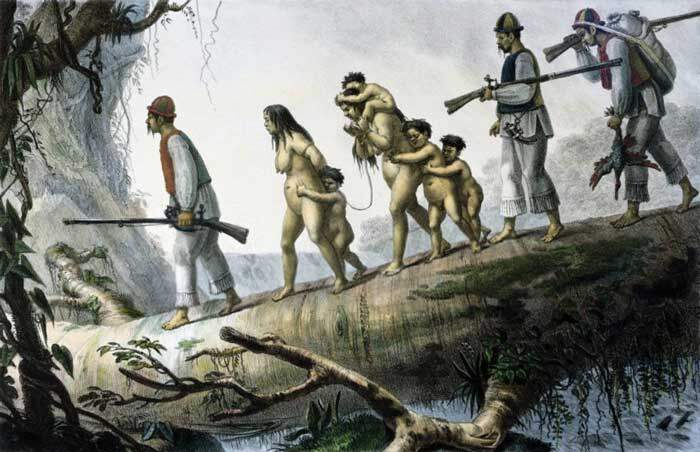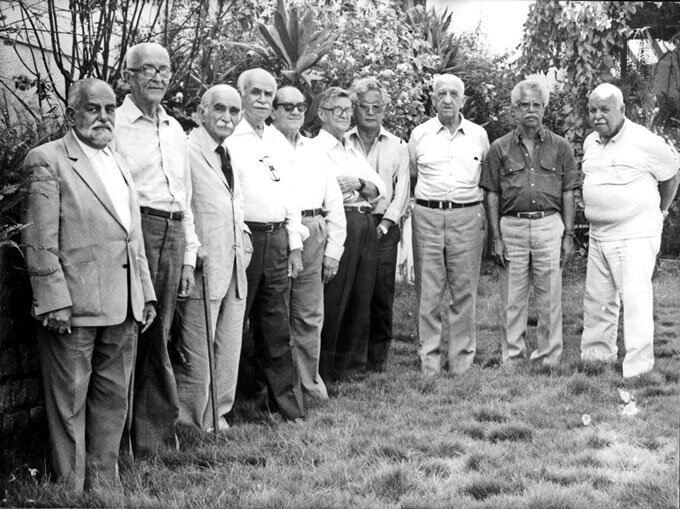The toil of the enslaved African was never a replacement for indigenous labour, which continued to be widely needed by the colonial economies and societies of Brazil, even after the arrival of Africans.
José Inaldo Chaves Jr
Translation from the Portuguese by TiraTEXT UK
Of all the misconceptions in the history and historiography of Brazil, one particularly laden with prejudice even today refers to indigenous peoples. Were they incapable of the toil and drudgery of sugar cropping and so were “replaced” by Africans, even at the dawn of Portuguese colonization? Too often, this commonly asked question evinces a narrow view of indigenous people in the construction of Portuguese colonial societies in America. We need to re-visit historiography and to understand from precise historical experience how the original inhabitants, whilst having their ways of life transformed, responded assertively to contact with Europeans.

The history of labour is, in this sense, a unique opportunity to observe socioeconomic and political phenomena that, although in most cases marked by violence, were also full of significance and survival. Historiography has revisited this issue and the findings are surprising. Contrary to what was said until very recently, it was not a supposed indigenous “indolence” that was responsible for the later reliance on the African slave in the economy of Portuguese America, with its emphasis on the foreign market. Although the idea of “native inappetence” for regular Western-style work is long-lived, going back to the reports of colonial chroniclers, a more complex approach has recently been developed.
New views
Plagued by wars, slavery and disease, the Amerindian coastal populations were drastically reduced or were forced to migrate inland in the 16th century. In addition to the human tragedy this represented, strong pressure was felt by the sugar mills, which depended on the constant labour supply to meet the growing European demand for “white gold”. This will be one of the fundamental reasons for the massive adoption of African field labour and the genesis of the Atlantic slave market from the 17th century.
But there are many other reasons. Invaded communities, who understood well the forest paths and its dangers, took flight or returned to raid, making control difficult. However, contemporaneous sources currently under analysis fully demonstrate that, despite so much misadventure, a significant part of the contacts between indigenous people and the Portuguese was based on the latter’s expectation of access to armies of labour, whether through captivity – applied, in theory, to enemy and non-subjected Indians via the so-called just wars and rescues – or to other types of paid or contracted work, which, after arduous negotiation with missionaries and indigenous chiefs, enabled the employment of village contingents in colonial economies.
Alongside their African counterparts cropping for export, the indigenous peoples continued to be widely deployed in colonial Brazil. They navigated their sugar canoes between rivers to the coastal ports, produced vegetables and the staple manioc flour, mixed remedies from the barren lands of Maranhão and Grão-Pará, cut timber opening up new agricultural areas, laboured in the cities, and in households, and provided a military contingent in wars against the enemies of the Portuguese Crown, whether they were foreigners or the much-feared “warrior Indians”.
Indigenous cultures were also the objects of colonizer observation and experimentation, ready to adopt the remedies of the indigenous pharmacy, the food and the native mapping, all of which aided colonial control.
Indeed, as allies or enemies, the indigenous people figured in colonial exploits, such as the conquests of Paraíba, Rio Grande and Ceará in the 16th century, the wars against the Dutch in the 17th century, and in the so-called “Barbarian wars” at the beginning of the 18th century, which took place in the north-east interior. In all these situations, the natives, in their political and socio-cultural plurality, forged and broke alliances with Europeans and other local peoples, acting as complex historical subjects in the face of the invasion of their territories and the transformation of their ways of living. As for the Portuguese, they understood all about military alliances with friends and truces with rebel Indians.
As subjects in the intense disputes between Jesuits and settlers about who controlled their work, indigenous peoples had never ceased to be an important part of Portuguese / Brazilian labour, even when they migrated to secondary activities related to agro-export.
Legislation and social practice
Between the 16th and 18th centuries, the many changes that Portuguese colonial legislation underwent and the great theological and legal debates around the high value of indigenous people in colonial societies from the Amazon to the River Plate, was never in doubt. Royal decrees on labour vacilated, sometimes forbidding, sometimes cancelling indigenous captivity in specific situations, but always based on the imposition of rules and restrictions of, as they saw it, the very rightful practice of enslavement. Such legal changes accompanied the clashes for control of these populations, but also affected the agreements and negotiations that they themselves devised.
In the middle of the 18th century, a time of intense rivalries between the Portuguese and Castilian thrones, it was received judgement among the main administrators of the Portuguese Empire that the occupation and colonization of this immense American territory, especially the Amazon, the Central- Oeste and River Plate, would not be fully secured without granting indigenous people the rights as subjects of the king of Portugal. An intense process of “westernization” ensued, involving the mandatory use of the Portuguese tongue, the acquisition of Western agricultural and commercial practice, and the imposition of the Christian family as the basic social unit, even changing the shape of native homes and encouraging mixed marriages between whites and Indians.
Measures set down in the famous “Directory of the Indians” (1757-1798), a legal instrument developed by the governor of the State of Grão-Pará and Maranhão, General Francisco Xavier de Mendonça Furtado, sought to erase ethnic identities and transform Indians into loyal soldiers and industrious subjects. Additionally, the Portuguese Crown, wished to loosen Jesuit control, reducing the local power of missionaries by elevating the village to the category of secularised township, with administrative responsibilities similar to those of the “non-Indians”.
Indigenous peoples: much more than “labourers”
However, as well as understanding the colonial work ethic as imposed upon indigenous societies, it is vital to feel the essence of such lives and their relation to the environment. Similarly, it behoves us to respect the otherness of the indigen, abandoning concepts that, over time, have tried to justify contempt, massacres, and other serious violations of their identities and territories.Certainly, understanding such a legacy, which reveals accounts of work and culture that are much more complex and dynamic than commonly believed, can help us to re-communicate with our indigenous family.
Find out more
Bibliography – New Indigenous History
Orobó, an indigenous community in Espírito Santo
Bibliography
ALMEIDA, Maria Regina Celestino de. Os índios na história do Brasil. Rio de Janeiro: Editora FGV, 2010.
CUNHA, Manuela Carneiro da (org.). História dos índios no Brasil. São Paulo: Companhia das Letras, 1992.
DOMINGUÊS, Ângela. Quando os índios eram vassalos: colonização e relações de poder no norte do Brasil na segunda metade do século XVIII. Lisboa: Comissão Nacional para as Comemorações dos Descobrimentos Portugueses, 2000.
MONTEIRO, John Manuel. O Escravo índio, esse desconhecido. IN.: GRUPIONI, Luís Donisete Benzi (Org.). Índios no Brasil. São Paulo: Secretaria da Cultura, 1992, p. 105-120.
OLIVEIRA, João Pacheco de. Os indígenas na fundação da colônia: uma abordagem crítica. IN.: FRAGOSO, João & GOUVÊA, Maria de Fátima (orgs.). O Brasil colonial. Vol. 1. 2ª ed. Rio de Janeiro: Civilização Brasileira, 2015, p. 167-228.
ZERON, Carlos Alberto de Moura Ribeiro. Linha de fé: a Companhia de Jesus e a escravidão no processo de formação da sociedade colonial (Brasil, séculos XVI e XVII). São Paulo: Edusp, 2011.
José Inaldo Chaves Jr graduated in History from the Federal University of Paraíba (2010), and gained a Master’s (2013) and a Doctorate (2017) in History from the Universidade Federal Fluminense. He is assistant lecturer in Brazilian History at the University of Brasília, where he is also a member of the Social History Laboratory (LHS). He has lectured at the Federal University of the South and Southeast of Pará (2014-2018) and at the Federal University of Amapá (2013-2014).His interests are mainly in the following areas: political history; social history; geo-history; space; region; territorialities; Indian people; local powers; northern captaincies; Colonial Amazon.
Translation from the Portuguese by TiraTEXT UK – [email protected]
How to cite this article
CHAVES JR, José Inaldo. Indigenous peoples and the issue of labour in colonial Brazil (Article). In: Café História – history made with clicks. Available at: https://www.cafehistoria.com.br/indigenous-peoples-in-colonial-brazil/. Published: Dec. 10 2019.






